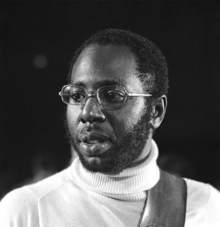
Back كرتس مايفيلد Arabic كرتس مايفيلد ARZ کورتیس میفیلد AZB Къртис Мейфийлд Bulgarian Curtis Mayfield Catalan Curtis Mayfield Czech Curtis Mayfield Danish Curtis Mayfield German Curtis Mayfield Spanish کورتیس میفیلد Persian
Curtis Mayfield | |
|---|---|
 Mayfield performing for Dutch television in 1972 | |
| Background information | |
| Birth name | Curtis Lee Mayfield |
| Born | June 3, 1942 Chicago, Illinois, U.S. |
| Died | December 26, 1999 (aged 57) Roswell, Georgia, U.S. |
| Genres | |
| Occupations |
|
| Instruments |
|
| Discography | Curtis Mayfield discography |
| Years active | 1956–1999 |
| Labels | |
Curtis Lee Mayfield (June 3, 1942 – December 26, 1999) was an American singer-songwriter, guitarist, and record producer. Dubbed the "Gentle Genius",[5][6] he is considered one of the most influential musicians of soul and socially conscious African-American music.[7][8] Mayfield first achieved success and recognition with the Rock and Roll Hall of Fame-inducted vocal group The Impressions during the civil rights movement of the late 1950s and the 1960s, and later worked as a solo artist.
Mayfield started his musical career in a gospel choir. Moving to the North Side of Chicago, he met Jerry Butler in 1956 at the age of 14 and joined The Impressions. The group's lead singer and primary songwriter, Mayfield became noted as one of the first musicians to bring more prevalent themes of social awareness into soul music. In 1965, he wrote "People Get Ready" for The Impressions, which was ranked No. 24 in Rolling Stone's list of the "500 Greatest Songs of All Time" in 2004.[9] The song received numerous other awards; it was included in the Rock and Roll Hall of Fame's "500 Songs that Shaped Rock and Roll",[10] and was inducted into the Grammy Hall of Fame in 1998.
After leaving The Impressions in 1970 in pursuit of a solo career, Mayfield released several albums throughout the decade, including his debut Curtis (1970) and the soundtrack for the 1972 blaxploitation film Super Fly. The soundtrack was noted for its socially conscious themes, primarily addressing issues that heavily affected inner city residents and racial minorities such as crime, poverty and drug abuse. The album was ranked No. 72 in Rolling Stone's list of the "500 Greatest Albums of All Time" in 2003.[11]
On August 13, 1990, Mayfield was paralyzed from the neck down during an accident in which lighting equipment fell on him during a live performance at Wingate Field in Flatbush, Brooklyn, New York.[12] Despite this, he continued his career as a recording artist, releasing his final album New World Order in 1996. Mayfield won a Grammy Legend Award in 1994 and a Grammy Lifetime Achievement Award in 1995.[13] He is a double inductee into the Rock and Roll Hall of Fame, as a member of The Impressions in 1991, and again in 1999 as a solo artist. He is also a two-time Grammy Hall of Fame inductee. He died from complications of type 2 diabetes at the age of 57 on December 26, 1999.[14]
- ^ Unterberger, Richie (n.d.). "Curtis Mayfield: Biography & History". AllMusic. Retrieved January 30, 2021.
- ^ Hoard, Christian; Brackett, Nathan, eds. (2004). The New Rolling Stone Album Guide. Simon & Schuster. p. 524. ISBN 9780743201698.
- ^ Garofalo, Reebee (2008). Rockin' Out: Popular Music in the USA. Pearson Prentice Hall. p. 179. ISBN 9780132343053.
... it was not until the mid-1960s that the social consciousness of folk music was linked to the popular appeal of the gospel/r&b fusion. The center for this innovation was Chicago and the often underappreciated Curtis Mayfield.
- ^ "Psychedelic Soul Music Genre Overview". AllMusic. Retrieved January 30, 2021.
- ^ Mitchell, Gall (March 30, 2015). "Curtis Mayfield Estate Gears Up for Soul Icon's 60th Anniversary". Billboard. Retrieved December 26, 2022.
- ^ Crandall, Bill (February 23, 2000). "Wonder, Hill, Clapton Praise Mayfield". Rolling Stone. Retrieved December 26, 2022.
- ^ Curtis Mayfield Archived November 23, 2006, at the Wayback Machine, Rock and Roll Hall of Fame and Museum. "...significant for the forthright way in which he addressed issues of black identity and self-awareness. ...left his imprint on the Seventies by couching social commentary and keenly observed black-culture archetypes in funky, danceable rhythms. ...sounded urgent pleas for peace and brotherhood overextended, cinematic soul-funk tracks that laid out a fresh musical agenda for the new decade." Accessed November 28, 2006.
- ^ "Soul icon Curtis Mayfield dies", BBC News, December 27, 1999: "Credited with introducing social comment to soul music". Accessed November 28, 2006.
- ^ "500 Greatest Songs of All Time". Rolling Stone. Archived from the original on June 15, 2018. Retrieved February 9, 2015.
- ^ "500 Songs That Shaped Rock". Infoplease. Retrieved February 9, 2015.
- ^ "500 Greatest Albums of All Time". Rolling Stone. Archived from the original on February 22, 2018. Retrieved February 9, 2015.
- ^ Phillips, Chuck (August 15, 1990). "Curtis Mayfield Injured in Stage Accident". Los Angeles Times. Retrieved November 1, 2019.
- ^ Cite error: The named reference
Thurber-1999was invoked but never defined (see the help page). - ^ Cite error: The named reference
Leigh-1999was invoked but never defined (see the help page).